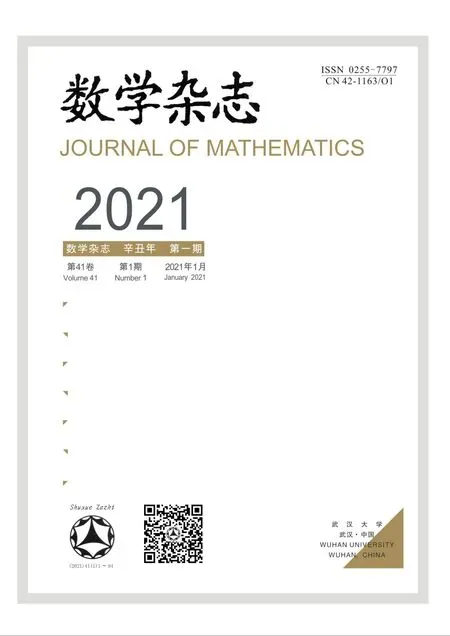ANNOUNCEMENT ON“SHARP ERROR ESTIMATE OF BDF2 SCHEME WITH VARIABLE TIME STEPS FOR LINEAR REACTION-DIFFUSION EQUATIONS”
ZHANG Ji-wei,ZHAO Cheng-chao
(1.School of Mathematics and Statistics,Hubei Key Laboratory of Computational Science,Wuhan University,Wuhan 430072,China)
(2.Beijing Computational Science Research Center,Beijing 100193,China)
Abstract:In this note we announce the sharp error estimate of BDF2 scheme for linear diffusion reaction problem with variable time steps. Our analysis shows that the optimal second-order convergence does not require the high-order methods or the very small time steps τ1=(τ2)for the first level solution u1.This is,the first-order consistence of the first level solution u1like BDF1(i.e.Euler scheme)as a starting point does not cause the loss of global temporal accuracy,and the ratios are updated to rk≤4.8645.
Keywords:BDF2;DOC;DCC;variable time-steps;sharp error estimate
In this note,we revisit the two-step backward differentiation formula(BDF2)with variable time-steps for solving the following reaction-diffusion equation:

where the reaction coefficientκ∈,and ? is a bounded domain.
Set the generally nonuniform time levels 0=t0 The BDF2 scheme with variable time-step is given as where the BDF2 formula can be unified to the following discrete convolution form whereCis a positive constant and Γn:=max{0,rk?rk+2}.As pointed out in[6]and[7],the magnitudes of Γncan be zero,bounded[6,pp.175]and unbounded[7,Remark 4.1]by selecting certain step-ratio sequence and vanishing step sizes.After that,Emmrich[8]improves the Becker’s constrained condition to 0≤rk≤1.91,but still remains the undesirable factor exp(CΓn)in theL2-norm stability.Chenet al.circumvent the factor exp(CΓn)in Becker’s estimate with a bounded factor exp(Ctn)with 0≤rk≤1.53,but lack the estimate in the ideal case of Γn=0.Recently,by using the technique of the discrete orthogonal convolution(DOC)kernels,a nice and interesting work[9]obtains the convergence with 0≤rk≤3.561.Here the DOC kernels are defined by whereδnkrepresents the Kronecker delta symbol withδnk=1 ifn=kandδnk=0 ifn/=k.One can see that the right-hand-side second term is the first-order convergence whentnis large.If the second-order convergence is obtained,it suffers from a restriction condition||≤N0?Nwith the index set defined by In this note,by introducing the novel conception of the discrete complementary convolution(DCC)kernels,we achieve the sharp second-order convergence for BDF2 scheme and update the adjacent time-step restriction condition to One can see that if the identity(8)holds for alln≥1,it only requires The first main contribution in our paper is establishing the positive semi-definiteness of BDF2 convolution kernels,which produces the constrain condition A1 on the adjacent time-step ratios. Lemma 0.1Assume the time step ratiosrksatisfy A1.For any real sequenceit holds that A immediate product of the semi-positive definiteness of the BDF2 kernels is the following energy stability for BDF2 scheme(2)(one also refers to[9]). Theorem 0.1Assume the condition A1 holds andκ≤0,then the discrete solutionunto the BDF2 scheme(2)with variable time steps satisfies Furthermore,the energy has the following estimate: Here the(modified)discrete energyEkis defined by Proposition 0.2Letτbe the maximum time-step size and the time-step ratios satisfy 0 To obtain the stability of the BDF2 scheme(2),we introduce a discrete Gr¨onwall inequality for the followingL2-norm estimate. Lemma 0.5Assumeλ>0 and the sequencesare nonnegative.If then it holds We now present the stability result of the BDF2 scheme(2). Theorem 0.2If the BDF2 kernelsdefined in(4)are positive semi-definite(or condition A1 holds),the discrete solutionunof the BDF2 scheme(2)is unconditionally stable in theL2-norm.Ifκ>0 and the maximum time-step sizeτ≤1/(4κ),it holds The truncation errorηj:=D2u(tj)??tu(tj)(1≤j≤N)can be expressed the following form Theorem 0.3Assume the conditions in Theorem 0.2 hold,and the truncated error can be expressed by whereGkandRnare given in(26).Ifκ>0 and the maximum time-step sizeτ≤1/(4κ),it holds Ifκ≤0,it holds Finally,applying the Lemmas 0.6,Proposition 0.2 and Theorem 0.3,we achieve the sharp error estimate. Theorem 0.4Letu(t,x)be the solution to problem(1).If the BDF2 kernelsdefined in(4)are positive semi-definite(or the condition A1 holds),then the solutionunto BDF2 scheme(2)is convergent in theL2-norm.Ifκ>0 and the maximum time-step sizeτ<1/(4κ),it holds Ifκ≤0,it holds More details can be found in[10].






















